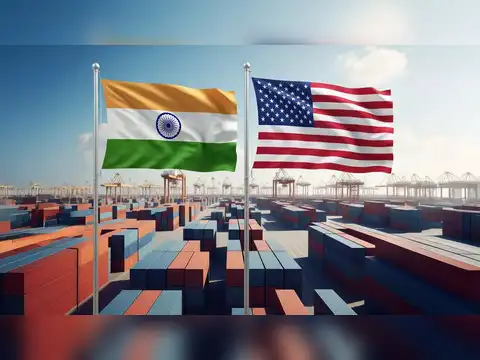Amid heated political rhetoric and punitive tariffs, India and the United States remain “intensely engaged” in trade negotiations aimed at finalizing a mutually beneficial agreement by the end of this month. According to officials familiar with the talks, the discussions are proceeding “strictly within the bilaterally agreed framework” established earlier this year—untouched by broader geopolitical tensions.
The framework, formally called the Terms of Reference (ToR) for the Bilateral Trade Agreement (BTA), was finalized on March 29 during the first round of talks in New Delhi. It laid out a roadmap for negotiations and has since anchored five physical rounds and several virtual sessions. The process has brought both nations to “substantial common ground,” officials say—enough to announce an interim deal soon.
“We are engaged through virtual mode as of date and likely to iron out remaining differences when the American negotiating team visits India for the sixth physical round this month,” ( source HT).
The sixth round of talks is scheduled for August 25, when a U.S. delegation arrives in New Delhi. Concrete outcomes are expected, despite President Donald Trump’s recent tariff move and sharp language directed at India.
Trump’s Tariff Offensive
On July 30, Trump announced punitive tariffs of 25% on Indian goods via Truth Social, citing India’s high trade barriers and its refusal to open sensitive sectors like agriculture, dairy, and MSMEs to unrestricted U.S. imports. He later added an unspecified levy linked to India’s oil purchases from Russia.
“I don’t care what India does with Russia… They can take their dead economies down together, for all I care,” Trump wrote on July 31.
This language followed reports highlighting that Russia supplied 39% of India’s crude oil imports in 2023, far ahead of Iraq (19%) and Saudi Arabia (16%). According to the U.S. Energy Information Administration (EIA), India ramped up Russian oil purchases after Western sanctions in 2022, boosting imports sixfold to 740,000 barrels per day.
India defends this approach as economic pragmatism. As one official explained:
“Economical and reliable energy supply is the top priority of India’s energy security, and heavily discounted crude from Russia meets both requirements. Our energy sourcing is diversified, involving 39 countries. We are not bound by any unilateral sanction—we follow only UN sanctions.”
Energy at the Heart of Trade Talks
The proposed trade deal may include commitments for greater U.S. energy exports to India, aligning with India’s efforts to diversify supply.
“Energy security is key, and the U.S. is endowed with natural resources. We will buy more American energy if it is commercially viable,” said another official. “But our policy of diversified sourcing—including Russia—will continue.”
India currently imports 87% of its crude oil and remains the world’s third-largest importer after the U.S. and China. Officials underscore that while enhanced U.S. energy imports could feature in the deal, it will not restrict India’s freedom to purchase oil globally.
The Bigger Picture: Trade Amid Geopolitics
This episode captures a familiar tension in U.S.-India ties: the strategic partnership coexisting with sharp trade frictions. Even as Washington courts New Delhi as a counterweight to Beijing, trade disputes—on tariffs, agriculture, and energy—continue to simmer.
From India’s perspective, its energy pragmatism and strategic autonomy are not negotiable. Its willingness to deepen energy trade with the U.S. while buying discounted Russian oil reflects a clear policy: pursue national interest without aligning rigidly with any single bloc.
The upcoming sixth round of talks will test whether practical economics can override political theatre. If successful, it would demonstrate once again that India and the U.S. can navigate disputes without jeopardizing a partnership rooted in both shared interests and mutual necessity.








